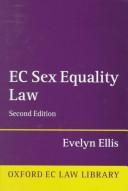| Listing 1 - 5 of 5 |
Sort by
|
Book
ISBN: 9781849467636 1849467633 9781509906215 9781509906239 Year: 2017 Publisher: Oxford: Hart,
Abstract | Keywords | Export | Availability | Bookmark
 Loading...
Loading...Choose an application
- Reference Manager
- EndNote
- RefWorks (Direct export to RefWorks)
Since the year 2000, the material and personal scope of EU non-discrimination law has been significantly broadened and has challenged national courts to introduce a comprehensive equality framework into their national law to correspond with the European standard. The book provides a multi-layered culturally informed comparison of juridical approaches to EU (in)direct sex and sexualities discrimination and its implementation in Germany and the Netherlands. It examines how and why national courts apply national non-discrimination law with a European origin differently, although the legislation derives from the same set of EU law and the national courts have to respect the interpretive competence of the CJEU. The book provides valuable insights into the national and European context which shape the dialogue and influences of the courts inter se, the national application of EU law, and the harmonisation process within the area of gender equality law and beyond. A Dutch and German comparison is of special interest here because both countries' approaches towards non-discrimination law are quite different despite the similarities in the respective legal systems; they are founding members of the EU, they are neighbours, they are civil law countries, and their legal systems are relatively similar at least compared to Scandinavian and common law jurisdictions. Therefore, the different reception EU non-discrimination law cannot simply be explained by obvious differences between the legal systems. Their comparison thus provides an interesting case study to uncover legal and non legal, cultural and historic, factors which influence the application of EU non-discrimination law in both countries. The book is of interest for EU, comparative and equality lawyers.

ISBN: 0471964360 9780471964360 Year: 1996 Volume: *2 Publisher: Chichester: Wiley,
Abstract | Keywords | Export | Availability | Bookmark
 Loading...
Loading...Choose an application
- Reference Manager
- EndNote
- RefWorks (Direct export to RefWorks)
Discrimination in employment --- Equal pay for equal work --- Sex discrimination --- Discrimination dans l'emploi --- Egalité de rémunération --- Discrimination sexuelle --- Law and legislation --- Droit --- Egalité de rémunération --- European Union countries --- Sex discrimination in employment --- Sex discrimination - Law and legislation - European Union countries. --- Éducation, formation --- Book

ISBN: 0198262248 9780198262244 Year: 1998 Publisher: Oxford : Clarendon press,
Abstract | Keywords | Export | Availability | Bookmark
 Loading...
Loading...Choose an application
- Reference Manager
- EndNote
- RefWorks (Direct export to RefWorks)
Sex discrimination --- Sex discrimination in employment --- Equal pay for equal work --- Law and legislation --- Discrimination, Sexual --- Gender discrimination --- Sexual discrimination --- Discrimination --- Sexism --- Gender mainstreaming --- Discrimination in employment --- Wages --- Women --- Employment --- Sex discrimination - Law and legislation - European Union countries --- Sex discrimination in employment - Law and legislation - European Union countries --- Equal pay for equal work - Law and legislation - European Union countries
Book
ISBN: 9780754673439 075467343X 9781315584003 9781317130314 9781317130321 Year: 2008 Publisher: Aldershot: Ashgate,
Abstract | Keywords | Export | Availability | Bookmark
 Loading...
Loading...Choose an application
- Reference Manager
- EndNote
- RefWorks (Direct export to RefWorks)
Containing contributions by some of the best known researchers in the field, this volume draws on a range of disciplinary perspectives to examine the effectiveness of the Open Method of Coordination as a medium for the advancement of gender equality within the EU.
Human rights --- Economic law --- Social law. Labour law --- European Union --- Sex discrimination --- Equality before the law --- Discrimination sexuelle --- Egalité devant la loi --- Law and legislation --- Droit --- Sex discrimination. --- Law - Europe, except U.K. --- Law - Non-U.S. --- Law, Politics & Government --- Gelijkekansenbeleid: Europese Unie --- OMC (=Open Method of Coordination) --- Gelijkekansenbeleid: Europese Unie. --- OMC (=Open Method of Coordination). --- Egalité devant la loi --- Sex discrimination - Law and legislation - European Union countries --- Equality before the law - European Union countries

ISBN: 9780521825160 0521825164 9780511495021 1107137624 051118140X 0511113315 0511299133 0511495021 1280434759 0511198108 0511112807 9780511113314 9780511112805 9781280434754 Year: 2005 Publisher: Cambridge, UK ; New York : Cambridge University Press,
Abstract | Keywords | Export | Availability | Bookmark
 Loading...
Loading...Choose an application
- Reference Manager
- EndNote
- RefWorks (Direct export to RefWorks)
The European legal order is largely based on judicial co-operation between the European Court of Justice and the national courts. Three case studies on Sunday trading, on equal treatment of men and women and on good faith in contract law reveal that national courts and national litigants are mainly pursuing national interests by means of European law. The European Court of Justice seeks European solutions by delimiting the scope of the European legal order, by transforming the subjective rights of market citizens into political rights of union citizens, and by developing European remedies to enforce European rights.
Law of civil procedure --- Human rights --- European law --- European Union --- International and municipal law --- Judicial process --- Sunday legislation --- Sex discrimination --- Good faith (Law) --- Law and legislation --- Blue laws --- Law, Sunday --- Sunday --- Ecclesiastical law --- Hours of labor --- Labor laws and legislation --- Weekly rest-day --- Holidays --- Sabbath legislation --- Store hours --- Discrimination, Sexual --- Gender discrimination --- Sexual discrimination --- Discrimination --- Sexism --- Gender mainstreaming --- Decision making, Judicial --- Judicial behavior --- Judicial decision making --- Judges --- Law --- Procedure (Law) --- Bona fides (Law) --- Bad faith (Law) --- Ignorance (Law) --- Mistake (Law) --- Psychological aspects --- Interpretation and construction --- General and Others --- International and municipal law - European Union countries. --- Judicial process - European Union countries. --- International and municipal law - Great Britain. --- Sunday legislation - England. --- Sunday legislation - European Union countries. --- Sex discrimination - Law and legislation - England. --- Sex discrimination - Law and legislation - European Union countries. --- Good faith (Law) - England. --- Good faith (Law) - European Union countries.
| Listing 1 - 5 of 5 |
Sort by
|

 Search
Search Feedback
Feedback About UniCat
About UniCat  Help
Help News
News